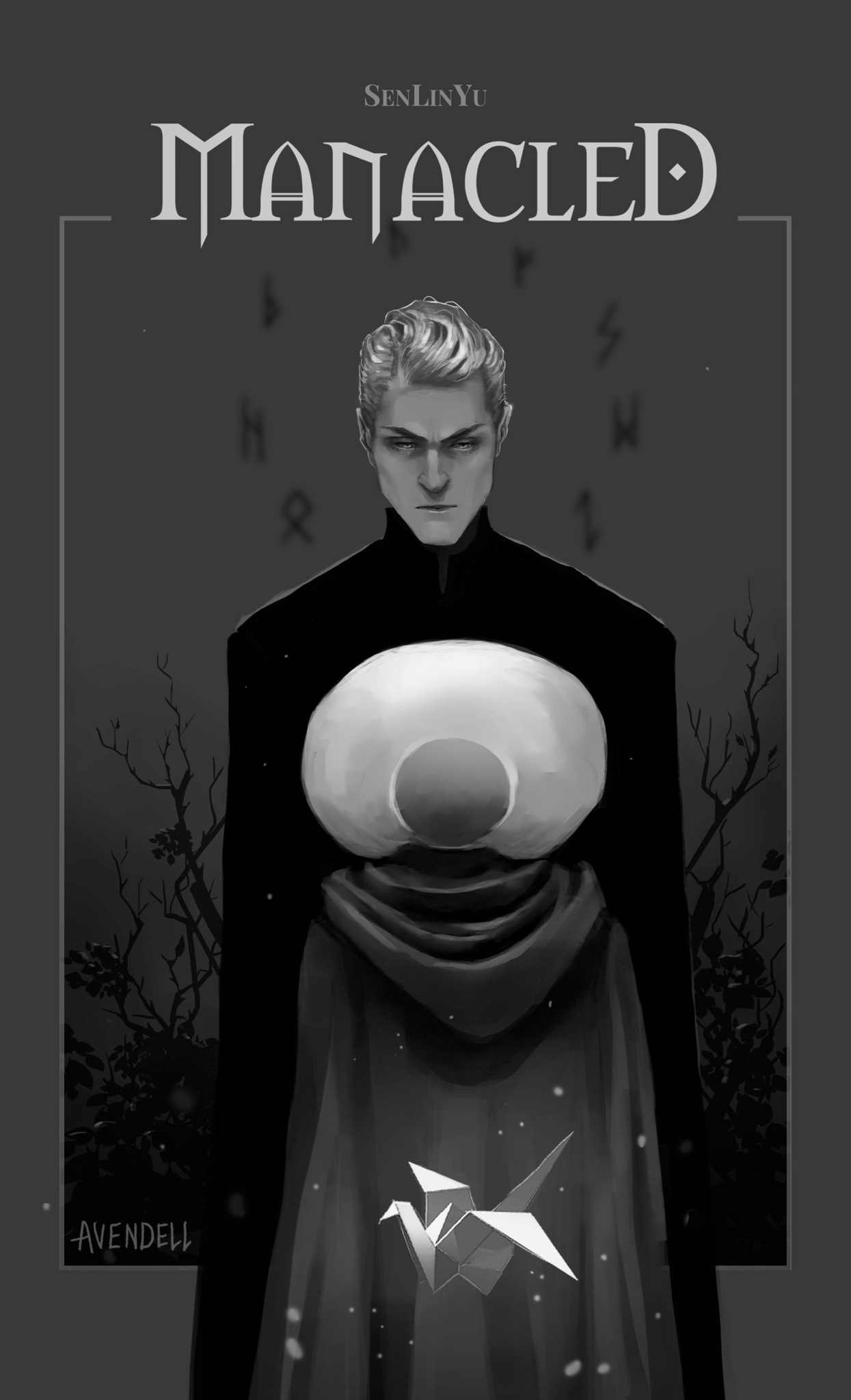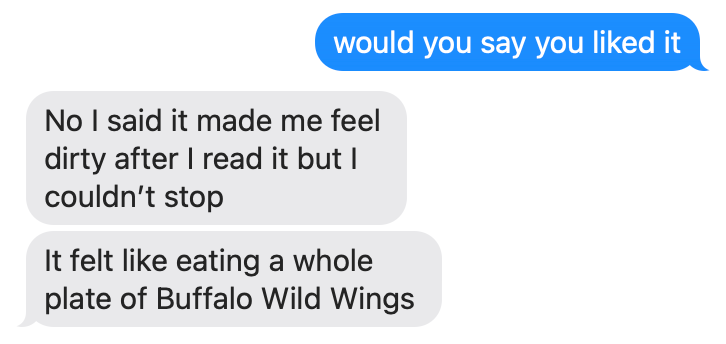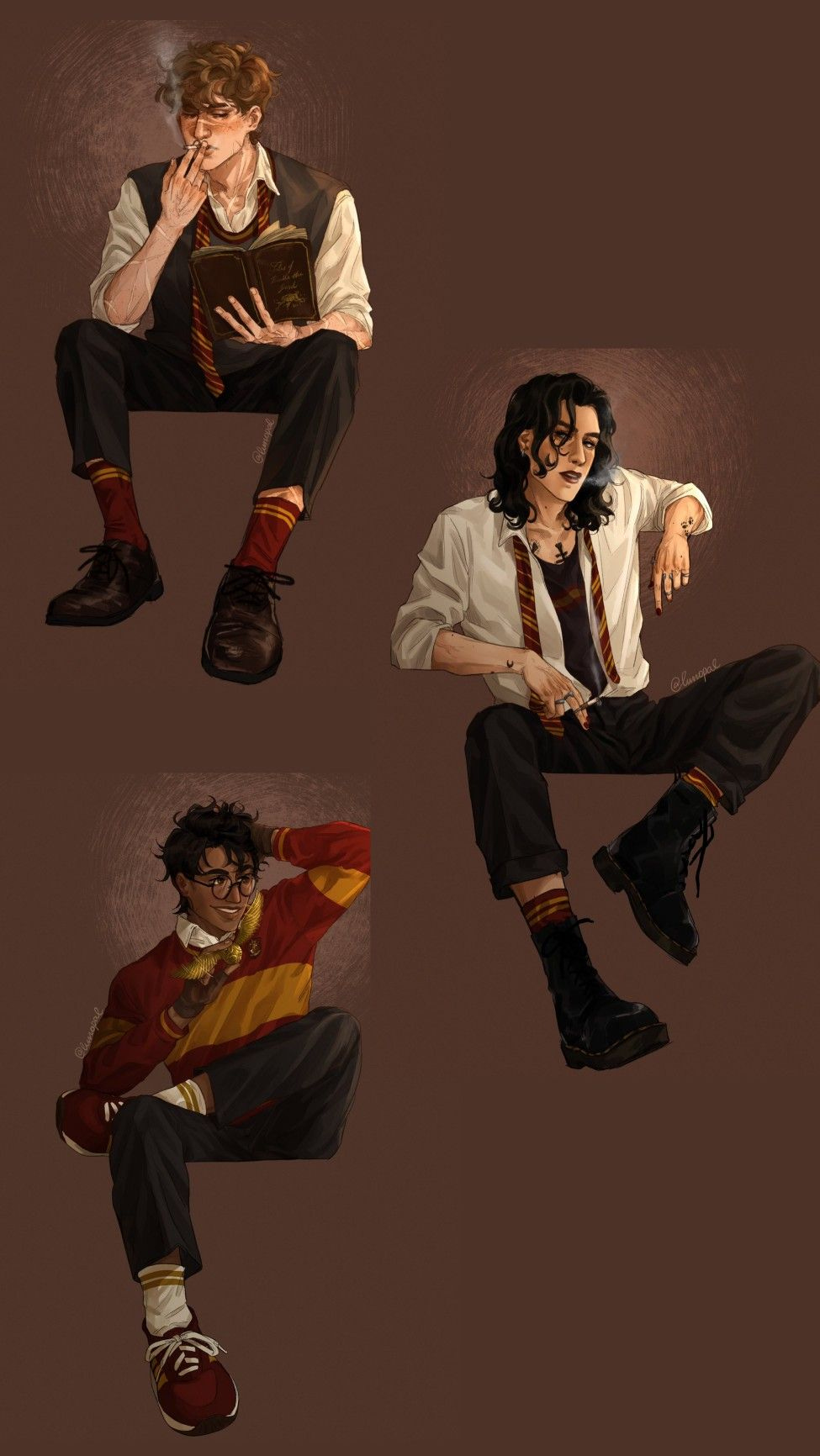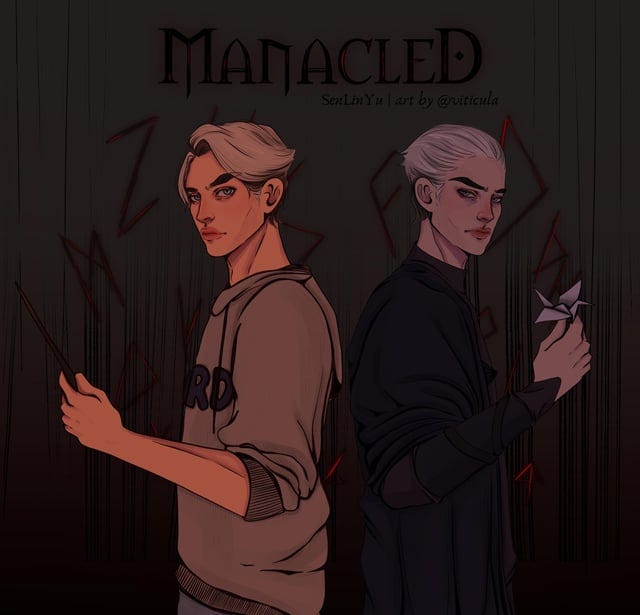I Solemnly Swear That These Fics Are Quite Good
A book report on two of the longest books I've ever read.
Over the last two years, I have read (slash listened to) two of the longest books I’ve ever attempted to read, and I wanted to write a bit about them. I know that’s not a very compelling way to start a newsletter, but stick with me at least until the first picture, okay?
All The Young Dudes is a deep dive into the power dynamics of a male friend group, a nuanced exploration of adoration and bullying, of loneliness and shame, of desperately craving intimacy but being unable to accept it when it’s offered. It’s a sprawling epic that covers the span of 25 years, maturing alongside its characters, changing as they change. It’s staggering in its magnitude, its world-building, and its realistic depictions of queerness, friendship, and love.
Manacled takes the pastel villainy endemic to YA literature and imagines it in blood red. It slams you with the reality of life under the rule of a monster, imagining how terrifying espionage would be against a seemingly omniscient dictator. It is a novel about brilliant, sensible, hardworking women, and the brand of naïveté unique to well-intentioned straight men. It is a wild, elaborate tapestry that doubles back on itself, making you doubt your own eyes as the characters doubt theirs.
Both works are deeply devastating and utterly romantic, tales of two irreparably broken people coming together, wondering if the sum of their parts is enough to ward off insanity.
They are, simply, two of the most engrossing books I’ve ever read. And yet you won’t find either in Barnes & Noble, because they are both Harry Potter fan fiction.
Despite everything about me suggesting that I’m intimately familiar with fan fiction, it’s actually not a medium I’ve engaged with since since middle school. I would say I am acquainted with it, but feel no ownership of it… fan fiction is to me what Buckbeak is to Harry Potter.
Thus, when these books were recommended to me (by friends and by social media) I was willing to give them a chance, but was suspicious that these works would transcend their genre. There are plenty of stories of fan fiction breaking into the mainstream - the best example being 50 Shades of Grey, which began its life as Twilight fan fiction - but, well, I don’t know if I would call that literature (that said, I’ve never read it). I felt that, at the very least, the work had to outweigh the shame of someone asking what I was reading, and me responding with “Harry Potter fan fiction.”
I first heard about Manacled via TikTok (I know, I hear myself, I promise). Intrigued by its popularity online, I asked around, and found out that a surprising number of people I knew had read it. When asked about it, they got a distant look in their eyes, akin to reminiscing about a toxic ex-boyfriend. “It’s crazy,” they said. “That book fucked me up.” My interest was piqued - how much could a fan-written romance about Hermione Granger fuck up an adult person? - and gave it a shot.
Even with the warnings, I was not prepared. Ultimately, I think Manacled might be the most adult book I’ve ever read, and I’m not being hyperbolic.
Manacled is non-canonical, and imagines a different outcome to the last book (and don’t worry, aspiring readers, I’ll keep my synopsis to what would be on a dust jacket). In this story, the Order of the Phoenix loses the war. Most of the characters we know and love have been murdered by Death Eaters, and the story follows Hermione as she struggles to survive - let alone fight - in a world governed by Lord Voldemort.
It asks what might become of “the brightest witch of her age” when she is faced with the unimaginable, and what former nemeses might become allies - or more - in dire circumstances. It is a “Dramione” work, which means it’s a romance between Draco Malfoy and Hermione Granger, a combination that I can’t say I ever considered prior to reading this book (Draco and Harry, of course, have undeniable sexual tension, but that goes without saying).

Like most great works of art, Manacled does not moralize, but instead poses questions, most notably “Is there any context in which the unforgivable can be forgiven?” and, related, “Is it moral to use evil in order to achieve good?” While the Harry Potter series occasionally delves into moral gray area, I don’t feel that Rowling was much interested in exploring the concept of goodness. Voldemort is firmly evil, and Harry is firmly good. Goodness wins, because it must.
In a time where it does not feel like a given that goodness and sensibility win, I found it oddly reassuring to read a tale of a world far grimmer than our current reality, where people are still fighting for what is right, even though the odds are stacked horribly against them. And I found the questions raised about what is just in wartime really thought-provoking; I feel like many of us right now are considering the morality of hypothetical assassinations.
Beyond its themes, I was floored by its world-building. While the story is certainly rooted in the world Rowling created, it expands so far beyond that, delving into the specificities of magic in a way that made my jaw drop.
At 370,000 words, Manacled is longer than Tolstoy’s Anna Karenina. In typical fan fiction form, it was released chapter by chapter, which I think is astounding, considering how much in later chapters is seeded early on.
It was impossible to put down. I felt a little guilty about being so consumed by a fan fiction until I managed to get my mom hooked on it (I don’t really trust my own taste, but I do trust hers). We flew to London while both reading the book (me listening, her reading on her phone), and as the plane landed, she looked at me. “I don’t want to get off the plane,” she said. “It means I have to stop reading.”
Ironically, the last time my mom and I were co-reading at that intensity was when the last Harry Potter book came out. I remember we bought two copies for the family, and were passing them back and forth, marking our progress separately so we could pick up whichever book wasn’t in use.
When I finished Manacled, I felt like my insides had been scooped out - a specific feeling that I’ve only experienced after a phenomenal read. It completely captured my attention, which is unfortunately an accomplishment these days, and I am not being hyperbolic when I say I will think about it forever.
That said, I am trepidatious in recommending it. Most of the people I know who’ve also read Manacled were traumatized by it in some way:
I am very aware that I came to this text as a man, and a person who has not experienced sexual assault. But I will say that I am not made of very strong stuff, and I was able to get through this text (and was very glad that I made it through to the end). While it was one of the more devastating books I’ve ever read, it was also one of the most romantic - the kind of book that makes you wonder if you even know what love is. It destroyed me, but I think sometimes it’s important to be destroyed.
All The Young Dudes, meanwhile, operates within the existing world of the Harry Potter franchise, and serves as a prequel and companion to Rowling’s books. It follows Remus Lupin from his acceptance to Hogwarts up through the events of Harry Potter and the Order of the Phoenix, and much of it is an exceptionally plausible imagining of Hogwarts in the 1970s. Author MsKingBean89 breaks from the established canon of the series to create a romance between Sirius Black and Remus Lupin, a combination known in the fanfic community as Wolfstar (a portmanteau of “werewolf” and “star” - Sirius is the name of the brightest star in the galaxy).
Whereas Manacled takes something beloved and curdles it beyond recognition, ATYD - for the most part - felt like returning to the original books. Indeed, many call it “the eighth Harry Potter book,” and I think that’s an apt moniker - while it’s not written in Rowling’s style, it gave me the same feeling of wonder I felt when reading the Harry Potter books for the first time.
I’ve gotten this far in the ‘sletter without mentioning JK Rowling’s disgusting transphobia, and I don’t want to gloss over it, nor bring her any profit or glory. On the contrary, I think part of the reason I loved these works so much is that the specter of Rowling’s idiocy looms over her books like dementors over the quidditch pitch, and by reading these fics, I felt like I was able to return to the world I used to loved so much, but with a free conscience. She gets no money from these, and almost certainly disapproves of the creative liberties taken. What’s not to love?
Metaphorically, it kinda feels like when Lady Gaga re-recorded “Do What U Want” with Christina Aguilera (I think this will make sense if you’re gay).
All The Young Dudes tackles one of the most common fan fiction subjects, the Marauders (if you’ve forgotten: James Potter, Sirius Black, Peter Pettigrew, and Remus Lupin), and begins firmly in the YA space. I think ultimately it grows out of that label, but it depends on your definition of young adult. I think I would give this book to an eighteen-year-old, but not a sixteen-year-old, if that helps.
Prequels are challenging: how do you create a compelling narrative, knowing how it all ends? We know the fates of all its main characters.
The new romance between Sirius and Remus is one reason to keep reading, certainly, but I think what makes this book impossible to put down is MsKingBean89’s exemplary fleshing-out of the world, and attention to detail. I cannot imagine how much she must have pored over the timeline to find out when to start seeding things. (Remember that Hagrid’s motorcycle was once Sirius’? Remember Sirius’ brother Regulus? and so forth).
Some specific highlights (while avoiding spoilers): the development of original/lesser-known characters, the incredibly well-thought-out pack dynamics of the werewolves, and remarkably accurate depictions of the nebulous not-quite-boyfriend space that makes up so much of my personal dating past (and present). While the book does not shy away from death, I found it was the romances in this series that made me cry, and cry I did (there was one night where I cried at three separate occasions while listening).
The novel is titled after a 1970 Mott the Hoople song (which I did know beforehand, but only because it was on the Juno soundtrack), and much of the joy of the series comes in seeing how 1970s teen culture might have made its way into the ancient walls of Hogwarts. Each chapter starts with lyrics of a song from the time period, which I heartily enjoyed (someone even compiled a Spotify playlist with every song mentioned).
All the Young Dudes is a truly gargantuan work. Published chapter-by-chapter online between 2017-2018, it includes 188 chapters, which cover 25 years of Remus Lupin’s life. At roughly 527,000 words, ATYD is nearly half the length of the entire Harry Potter series (1,084,170 words). For additional context, translations of War & Peace hover at about 560,000.
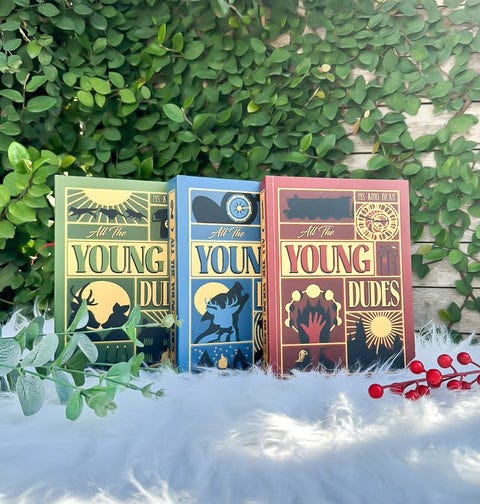
In my opinion, it’s the perfect addition to the Harry Potter universe, and felt much truer to the spirit of the existing series than the Fantastic Beasts and Where to Find Them films or Harry Potter and the Cursed Child. This is the series that should be in development right now, not the reboot that’s somehow already at the casting stage.
Lastly, I would be remiss if I did not mention the All the Young Dudes conspiracy theory, which is that Taylor Swift wrote this fanfic. I think this is rooted predominantly in the author having 89 (Taylor’s birth year and favorite number) in her username. As Swift would have been releasing a chapter a day at the height of the Reputation tour, I find this conspiracy difficult to believe. The writing is also nuanced, unpretentious, and consistent, none of which are adjectives I’d apply to (my beloved) Taylor’s work.
The texts have some interesting commonalities, apart from being internet sensations born from the world of Harry Potter. Both expand greatly on the character of Poppy Pomfrey, medi-witch of Hogwarts; both give a new insight into the mind of Severus Snape; both pick an aspect of magic somewhat neglected by Rowling’s writing and get so meticulous in their detail that it feels like they had a magical Grey’s Anatomy handy. (Greyback’s Anatomy? Granger’s Anatomy? I’m close to something…)
I will also say that, both texts are, for lack of a better word, fanficky. Manacled uses the phrase “his lips quirked to the side” much more often than it should, and there’s a moment in ATYD which finds a young Remus Lupin reading Emma.
I find these foibles endearing - it reminds me of the incredible Renaissance painters who could expertly paint dappled sunlight, but were unable to paint a baby that did not resemble a creepy old man. The transcripts are also fairly typo-heavy, and while I’m something of a grammar pedant, I found it hard to be mad - who among us wouldn’t typo if we were churning out a chapter a day with no editor?
So why am I writing this? Firstly, because I want to acknowledge good literature that may not be socially acceptable to love openly. As I said in my eulogy for Sophie Anderson, I think we sometimes dismiss sources of wisdom, art, and joy for not looking like we imagine them to. Or in other words: judging a book by its cover. Or in otherer words, judging the AO3 manuscript by its fan art.
This is not me saying that all fan fiction has artistic merit - obviously, there is a lot of unreadable drek out there. But there are also a lot of unreadable published novels. There’s amateur art that’s exquisite, and “professional” art that sucks ass. Every medium has genius, shit, and mediocrity. The combination of talent, taste, and work ethic is what creates greatness, and I think these pieces have that.
And for what it’s worth, both of these books have a higher Goodreads rating than any of the Harry Potter series, which, sure, may be due in part to other factors beyond quality. But still - impressive!
Secondly, I’m writing this essay because honestly… I’m still somewhat baffled that they were good. I found them both to be really eloquent, honest explorations of the human psyche, and despite their magical circumstances, they felt incredibly grounded in reality. It’s hard to reconcile that with the fact that they’re fan fiction - a deep wisdom regarding social dynamics and the ability to replicate a compelling romance aren’t particularly qualities I imagine belonging to the type of person who might write 500k words about Harry Potter.
Moreover, in a world where local communities are suffering greatly from unrestricted corporate monopolies, I am exceedingly impressed by the altruistic nature of fan fiction. The idea of devoting even an hour to writing something that I may not ever profit off of is hard enough to wrap my mind around, but to spend years crafting a masterpiece, knowing that you cannot make a dime off of it, is a remarkable and radical act.
Thus, I would argue that writing fan fiction is the ultimate act of creation for creation’s sake - art at its most enlightened form.
Admirably, MsKingBean89 is uninterested in any type of acclaim - she has repeatedly stated her lack of interest in engaging with the public, even writing “Do not contact me” in bold at the end of the novel. Her identity is unknown to this day (leading many to wonder if perhaps she’s become a successful writer under a different name).
SenLinYu, author of Manacled, on the other hand, is currently working on a rewrite of Manacled titled Alchemised, which will be formally published, and thus scrubbed of all its Potterisms. While I think the work will benefit from an editor, I can’t help but feel like it will lose something without the Wizarding World background. I can’t really go into more detail without spoilers, but suffice it to say that if you’re interested, I have a pdf of the original that I’m happy to send out (and there’s a link to the audiobook at the end of this post).
I can’t be too mad at SenLinYu for going the 50 Shades route; I’m glad she’s going to get paid for what is truly exemplary work. And I doubt she ever expected this result, so the original intention of creating for creating’s sake still feels noble to me.
Continuing my socialist screed, I am deeply impressed by the way that fan fiction builds community. There’s tons of fan art (much of which I’ve included in this essay), and passionate discussion of the literature on virtually every platform. Each book has multiple audio versions, narrated by ordinary people who simply loved the text and wanted to give the world an audio version of these books (a phenomenon called “podficcing”).
I consumed All the Young Dudes via a mixture of audio and transcript, relying on the narration of an account called Fleur’s Uploads, run by Issy Taylor.
I just did the math, and she recorded roughly 59 hours of these books. It’s hard to imagine recording 59 hours of audio content for any purpose (most audiobooks are under 20) and near impossible to imagine doing it for free - without deadlines, without editors, and of course, without pay.
Is it polished? Not quite, but the comments are full of encouragement, opinions, and help (sometimes, when she records multiple chapters at once, someone will comment with what time each chapter begins, to assist those trying to start partway through).
A few times, she includes a personal preface or postface (a word I just discovered) as herself, apologizing for something (I’ve been pronouncing “Andromeda” as “Andromedea”), asking for input (“Do you think at this point I should just keep saying “Andromedea,” or switch to “Andromeda?”), or explaining a choice (“I decided to record only one chapter this week, because this one is sweet, and next week we launch into the war”).
I’m so grateful that these books gained popularity before the rise of AI; I worry that podficcing will die out soon, because text-to-speech AI has gotten so good so quickly.
The AI audiobooks will be much less amateur, take much less time, and the sound quality will be phenomenal. I also think something beautiful and special will have died.
Ultimately, I just feel grateful that I was introduced to this community and these texts, and I want to spread the gospel. I won’t insist that you put these books on your reading list, but I do request that you not condescend to me about them unless you’ve read them.
Here are some reviews from friends of mine, if you are distrustful of my taste.
All the Young Dudes:
Manacled:
If you read (or have read) either book, let me know - they’re really all I want to talk about right now. If you’re an ex-Harry Potter fan looking to get back into reading, I can nearly guarantee that these books will turn you into a reader again.
Mischief managed,
Johnny





